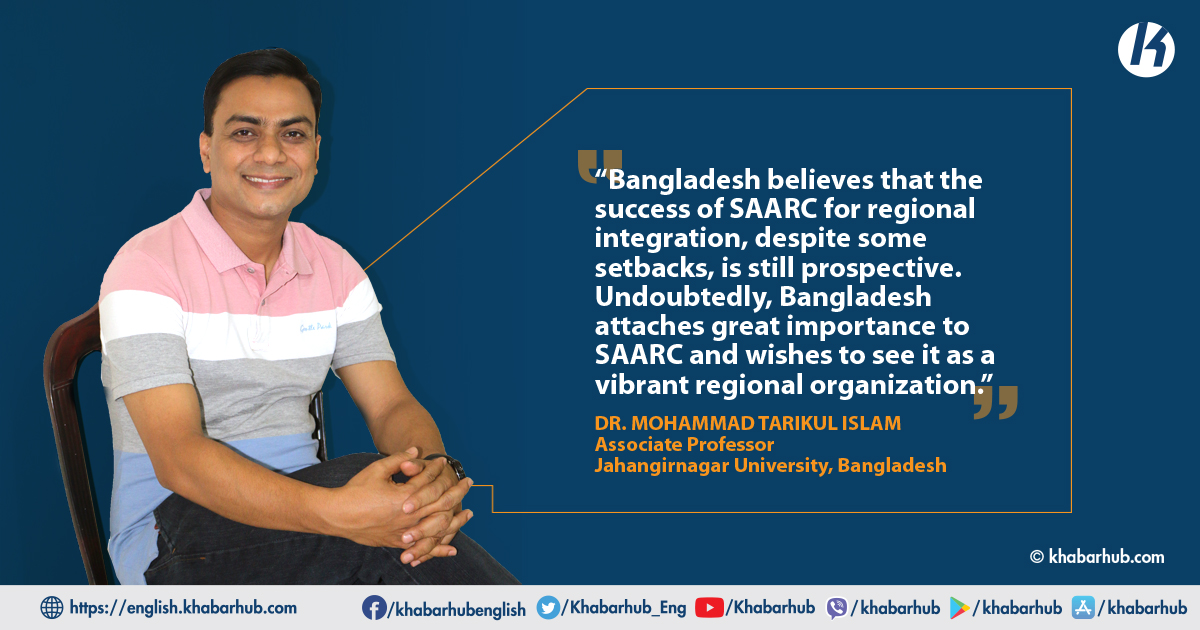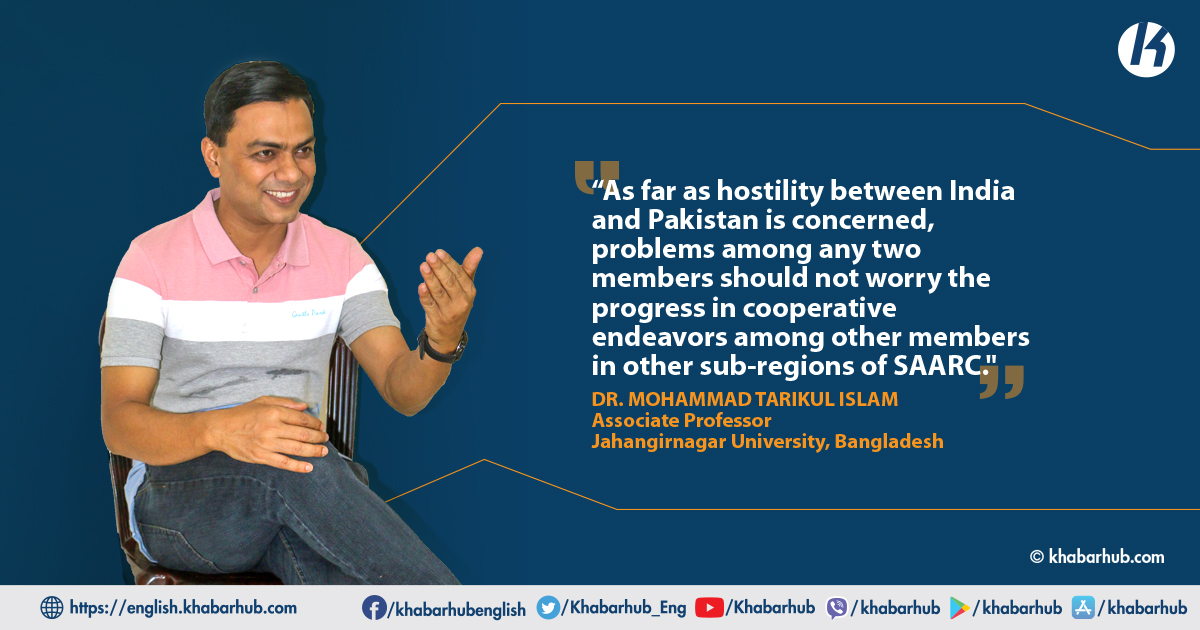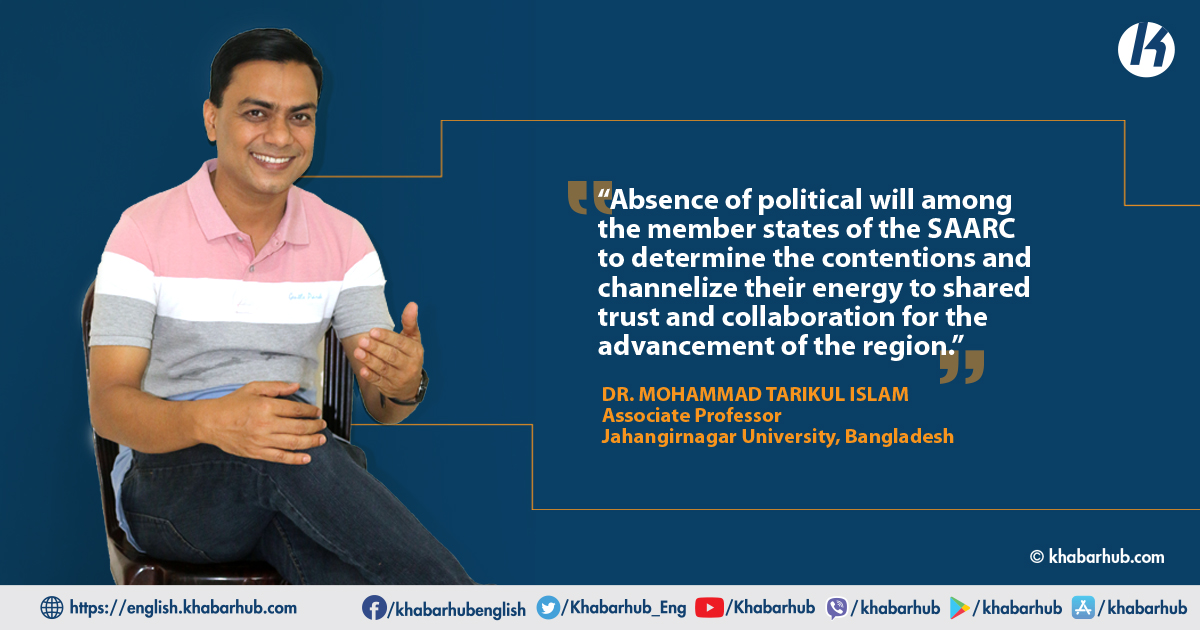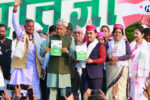Dr. Mohammad Tarikul Islam is an Associate Professor of the Department of Government and Politics at Jahangirnagar University in Bangladesh. He has been a Visiting Scholar at the University of Oxford and the University of Cambridge, United Kingdom.
Before joining the university, Dr. Islam was serving the United Nations Development Programme for a period of seven years.
The School of Oriental and African Studies (SOAS), University of London has recently appointed Professor Islam as a Visiting Fellow. Professor Islam took out some of his time to speak with Khabarhub on the underlying challenges of SAARC and its chance of reinforcement. Excerpts:
How do you evaluate the SAARC as a regional entity in close to 36-year of its existence?
To me, SAARC’s advancement has generally been blocked by enduring regional disputes. Clearly, its inadequacy is embroiled in the regional security complex of South Asia.
It couldn’t figure out how to profit by its geostrategic area in world politics and remained poorest when contrasted and different locales.
Unfortunately, it has constantly been showing descending patterns in earlier years too. The reasons for less advancement of SAARC in South Asia are some; all things considered, Indo-Pak contention and India’s big brother attitude in the SAARC district are notable.
You know India, is the biggest power of South Asia, as far as size and populace in this way the wide range of all the other member states take a look at it with doubt and the relations of India with its neighbors isn’t of shared trust making the working of SAARC incapable and worrying.
On the top, there is an absence of political will among the member states of the SAARC to determine the contentions and channelize their energy to shared trust and collaboration for the advancement of the region.

Can SAARC promote connectivity for the common interests of its member states?
You know, SAARC is aimed at promoting the welfare of the people by the way of accelerating economic growth, social progress and cultural development as well as strengthening collective self-reliance.
The organization also seeks to contribute to mutual trust and understanding among the member countries.
Regrettably, the countries of SAARC have a serious lacking of economic complementarity, rather they are economically competitive markets where each nation sends out generally similar merchandise like spices, cotton, jute, and so forth.
Besides, there is less intra-regional trade in the region which obstructs a combination of economic lines in the sub-continent. Like the EU, the entire thought of SAARC is a common market.
The two associations (SAARC and BIMSTEC) focus on geographically overlapping regions. Notwithstanding, this doesn’t make them equivalent to other options.
SAARC is a simply regional association, while BIMSTEC is interregional and interfaces both South Asia and ASEAN.
To the extent that their regions of interest overlap, SAARC and BIMSTEC supplement each other regarding capacities and objectives. BIMSTEC gives SAARC nations a remarkable chance to associate with ASEAN.
To get every one of the incorporating issues, similar to availability, people-to-people contact and streamlined commerce in the region, it should fall in a spot so the entire region can profit.
There is a requirement for brilliant boundaries or consistent availability in the entire region. It includes not only roads and bridges but maritime, railway, telecom, and the rest of it. Inferable from nearness among South Asian states, cross-border cooperation is inescapable if the decrease of contentions, tackling the menace of terrorism and smooth exchange is the aim of South Asian leaders.
Do you find the SAARC virtual meeting on collective efforts in COVID response called by the Indian Prime Minister as a new spirit of regional cooperation?
Confronted with the COVID-19 pandemic one of the primary moves by the Indian Prime Minister Modi was to assemble for SAARC to attempt to face the infection that made destruction with every nation including the South Asian geography.
The SAARC virtual gathering was huge for an assortment of reasons, not exclusively were the SAARC leaders meeting interestingly since 2014 yet additionally, the conditions were admirable.
Modi initiated the voluntary COVID-19 Emergency Fund for the SAARC countries for emergency medical supplies and kits.
In recent months many of the member States Bangladesh, Nepal, Sri Lanka have been clamoring for SAARC to become a more functional organization.
The pandemic has shown a compelling method of utilizing the stage that SAARC gives to work to the common interests and prosperity.

To what extent, can Bangladesh demonstrate its credible leadership in fortifying the SAARC?
Bangladesh believes that the success of SAARC for regional integration, despite some setbacks, is still prospective.
Undoubtedly, Bangladesh attaches great importance to SAARC and wishes to see it as a vibrant regional organization.
Bangladesh is committed to the principles and objectives of the SAARC Charter. Bangladesh consistently sees that the SAARC must keep working.
Coherently, the Prime Minister of Bangladesh Sheikh Hasina, on the sidelines of the World Economic Forum (WEF) Annual Meeting 2017 at Davos, asserted that “SAARC is as yet alive.”
She unequivocally accepts that the South Asian region with its geographical proximity has great potential for cooperation in the connectivity sector.
The smaller countries need to particularly push India to be the big country with a big heart, and to do this it has to put resources into multilateral discussions.
What could be the expected role of India in strengthening SAARC?
India being regionally the biggest, populace astute the largest, development-wise the most evolved nation of South Asia, has the potential and assets in the fruitful operationalism of the SAARC programs.
It ought to deny its one-sided approach and should assume an instrumental part in advancing deregulation and free development inside its neighboring countries.
Interestingly, India shares its territory line with a large portion of the SAARC nations. Bearing in mind the regional dynamics, a realistic option for South Asian countries is to believe in the value of functionalism, which would mean avoiding debatable issues at this stage, for enhancing cooperation through SAARC.
As an academic, are you optimistic about the effectiveness of SAARC?
Notwithstanding numerous loopholes, I trust SAARC has not been totally latent. What should be guaranteed, notwithstanding, is that SAARC advancement or improvement ought not to get involved with the strategic operation in the region.
In this vein, a lot remains to be done. Nevertheless, with a logical and feasible way forward encounters can be turned into opportunities.
As far as hostility between India and Pakistan is concerned, problems among any two members should not worry about the progress in cooperative endeavors among other members in other sub-regions of SAARC.
Progress and success story in those areas could serve as an inducement for other areas and lead to the evolution of SAARC as an effective organization, I consider.
Again, regional connectivity is the lynchpin of peace, stability, development, and prosperity in South Asia.
It ought to be remembered that SAARC isn’t implied distinctly for economic cooperation but also for cultural and people-to-people contact, and for all the resource sharing in the region.








Comment